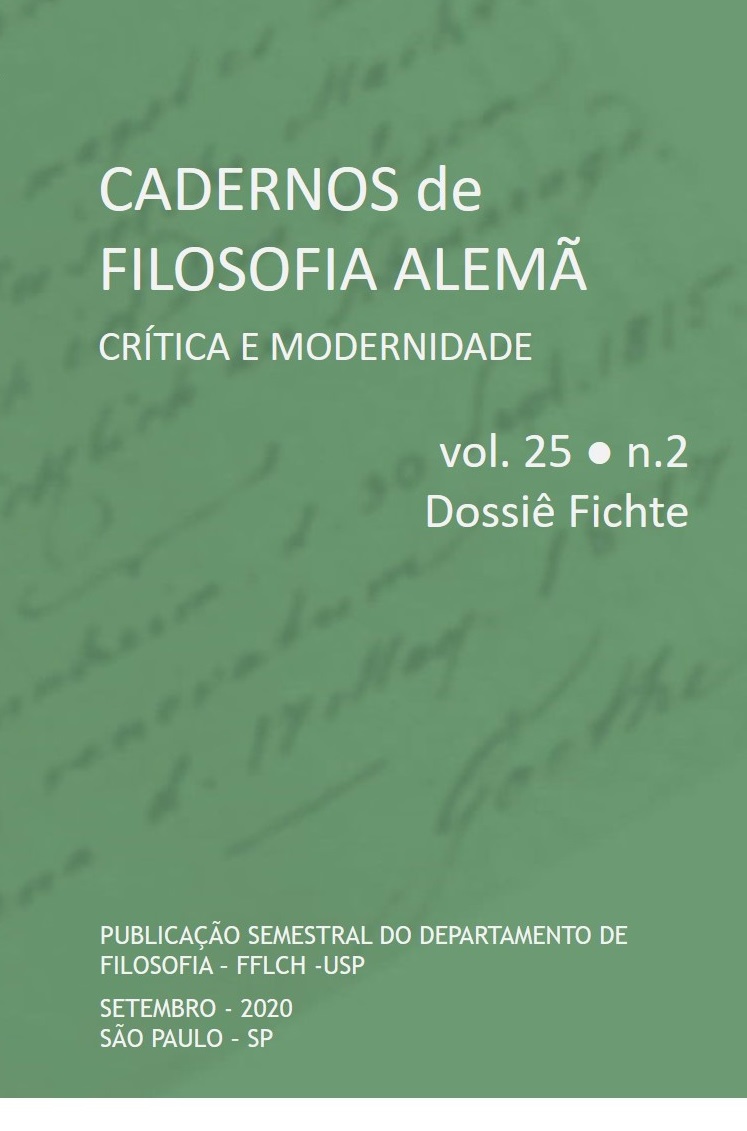Education towards Weakness? Selbstaufhebung and You in Novalis' Study of Fichte
DOI:
https://doi.org/10.11606/issn.2318-9800.v25i2p137-153Keywords:
Novalis, Fichte, Fichte-Studien, You, formation, imaginationAbstract
Novalis develops the Fichtean ideas of dialectic between I and Not-I showing a micro-macrocosmic relation between I and World. Education of I corresponds here to forming of I within the World. This paper applies the category of weakness to describe the new necessary position of I as a movement outside itself (Selbstentäußerung): this would allow the world to be world as such without being only a product of I. The paper shows further that the same mechanism of weakness is at work in a political (Glaube und Liebe) and historical context (Die Christenheit oder Europa).
Downloads
References
Fuentes primarias
Baader, Filosofia Erotica: Baader F. Von. (1982). Filosofia erotica. Edición de L. Procesi Xella. Milano: Rusconi.
Fichte: Grundlage: Fichte, J.G. (1971). Grundlage der gesammten Wissenschaftslehre 1794. In Fichtes Werke, I, ed. de I. H. Fichte. Berlin: de Gruyter.
Fichte: Segunda Introducción: Fichte, J.G. (1971). Zweite Einleitung. In Fichtes Werke, I, ed. de I. H. Fichte. Berlin: de Gruyter. Trad. Primera y segunda introducción a la Teoría de la Ciencia. (1984). Ed. de J. Gaes. Madrid: Sarpe.
Fichte: Sittenlehre: Fichte, J. G. (1971). System der Sittenlehre. In Fichtes Werke, ed. de I. H. Fichte. Berlin: De Gruyter (1834 ff.). Trad. it. Il sistema di etica secondo i principi della Dottrina della scienza. Ed. de C. de Pascale, Roma-Bari: Laterza 1994.
Fichte, J. G. (1979). Grundlage des Naturrechts nach Prinzipien der Wissenschaftslehre (1796). Hamburg: Meiner.
Fichte: Bestimmung des Gelehrten: Fichte, J. G. (1991). Einige Vorlesungen über die Bestimmung des Gelehrten. Trad. it. La missione del dotto. Pordenone: Studio Tesi (Editori Riuniti 1982).
Hölderlin: SW: Hölderlin, F. (1996). Sämtliche Werke. Historisch-kritische Ausgabe. Edición de D. E. Sattler. Frankfurt a. M.: Roter Stern 1974 ss. (Darmstadt: WBG 2004). Trad. it. de R. Ruschi, Scritti di estetica, Milano: Mondadori.
NS: Novalis (1960). Novalis Schriften. Edicción de R. Samuel, J. Mähl et a. Stuttgart: Kohlhammer 1960 ss.;
ES: Novalis (2007). Estudios sobre Fiche y otros escritos. Edición de R. Caner-Liese. Madrid: Akal.
SF: Novalis (2019). Opera filosofica. Edición de G. Moretti y F. Desideri. Torino: Einaudi 1993. Nueva edición Scritti filosofici. Brescia: Morcelliana.
Plotino: Enn.: Plotino (1999). Enneadi, edición de G. Faggin. Milano: Rusconi (1992).
Schiller: Philosophische Gedichte: Schiller, F.(1990). Philosophische Gedichte. Stuttgart: Reclam 1978, trad. it. de G. Moretti, Poesie filosofiche, Milano: SE.
Literatura secundaria
Brandt, A. (2010). Weltbürgertum und Nationalidee in Fichtes Bildungskonzept. In J. Stolzenberg y L. T. Ulrichs (ed. de). Bildung als Kunst: Fichte, Schiller, Humboldt, Nietzsche. Berlin: De Gruyter, pp. 59-68.
Buber, M. (1993). Il principio dialogico ed altri saggi. Milano: San Paolo.
De Mazza, M. E. (1999). Der verfaßte Körper. Zum Projekt einer organischen Gemeinschaft in der Politischen Romantik. Freiburg im Breisgau: Rombach.
Desideri, F. (1998). L’ascolto della coscienza. Una ricerca filosofica. Milano: Feltrinelli.
Frank, M. (2002). Selbstgefühl. Eine historisch-systematische Erkundung. Frankfurt a. M.: Suhrkamp.
Freud, S. (1992). Das Unheimliche, in Gesammelte Werke. Edición de A. Mitscherlich, A. Richards, J. Strachey. Frankfurt am Main: Fischer 1982, Band XII, pp. 241-274. Trad. it. Il Perturbante, en Opere 1905-1921. Roma: Newton & Compton, pp. 1049-1070.
Loheide, B. (2000). Fichte und Novalis. Transzendentalphilosophisches Denken im romantisierenden Diskurs. Amsterdam-Atlanta: Rodopi.
Panno, G. (2005). “Urkönig-Urmensch: romanticismo politico e katechon del re”. In: Ethics, pp. 55-81.
Panno, G. (2007). Relazione e Schweben nelle Fichte Studien di Novalis. Padova: Imprimitur.
Schmitt, C. (1981). Politische Romantik. Berlin: Duncker & Humblot 1919. Trad. it. Romanticismo politico, a cura di C. Galli. Milano: Giuffrè.
Summerer, S. (1974). Wirkliche Sittlichkeit und ästhetische Illusion. Die Fichte-Rezeption in den Fragmenten und Aufzeichnungen F. Schlegels und Hardenbergs. Bonn: Bouvier V. Herbert Grundmann.
Stanchina, G. (2002). Il limite generante. Milano: Guerini e Associati.
Traub, H. (2006). Über die Pflichten des ästhetischen Künstlers. Der § 31 des Systems der Sittenlehre im Kontext von Fichtes Philosophie der Ästhetik. En> C. Asmuth y Wilhelm Metz (eds.). Die Sittenlehre J. G. Fichtes 1798-1812. Amsterdam, pp. 55-106.
Waibel, V. (2006). Filosofiren muß eine eigne Art von Denken seyn«. Zu Hardenbergs ›Fichte-Studien‹ In: System und Systemkritik. Beiträge zu einem Grundproblem der klassischen deutschen Philosophie, hrsg. von Birgit Sandkaulen. Würzburg: Königshausen und Neumann, pp. 59-90.
Waldenfels, B. (1997). Topographie des Fremden. Frankfurt a. M.: Suhrkamp.
Wanning, B. (1997). Statt Ich-Du! Die Umwendung der Fichteschen Wissenschaftlehre ins Dialogische durch Novalis (Friedrich von Hardenberg). Fichte Studien, 12, 153-169.
Downloads
Published
Issue
Section
License
Copyright (c) 2020 Giovanni Panno

This work is licensed under a Creative Commons Attribution-NoDerivatives 4.0 International License.
Information and conceptions on the texts are complete responsibility of the authors.
All the articles submitted before July 5th 2018 and those published after July 2021 are licensed under a CC BY-NC-ND license – except those published between the aforementioned dates, which are under the CC BY-NC-SA license. The permission for the translation of the material published under the license CC BY-NC-ND by third parts can be obtained with the consent of the author.
Open access policies - Diadorim
Rules applied before July 5th 2018:
Presenting a submission to our Editorial Board implies granting priority of publication for “Cadernos de filosofia alemã”, as well as transferring the copyright of texts (once published), which will be reproduced only with the manifest authorization of the editors. Authors keep the right to reuse the texts published in future editions of their work, without paying any fees to "Cadernos”. We will not grant the permission to re-edit or translate the texts for third parts without agreement of the author.


